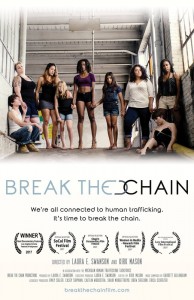
“Human trafficking is something we’ve never been without in the United States. We even fought a war, everybody knows that, and there was an assumption that it indeed ended slavery.
“It did not.”
The trailer for “Break the Chain,” a Michigan-made documentary, makes no bones about human trafficking’s enduring presence in American society.
The film’s bluntness and refusal to pull any punches is precisely why Orion-Oxford Michigan Abolitionist Project (MAP) members are holding a screening for the community.
“Break the Chain” will be shown free of charge on Monday, Oct. 15 at Lake Orion High School. It starts at 6:30 p.m.
The film will be followed by a Q&A session featuring Jane White, founder of Michigan Human Trafficking Task Force; Wendy Reyes, lieutenant with the Oakland County Sheriff’s Department; Debbie Monroe, a human trafficking survivor and Edee Franklin, founder of Sanctum House Rehab.
“Break the Chain” follows two survivors of human trafficking, Kwami and Debbie, as they tell their stories. Kwami spent five years working with little to no rest and was frequently beaten while being a slave in Ypsilanti, and Debbie spent nearly all of her teenage years as a sex slave in metro Detroit.
“I think people have a hard time thinking about (human trafficking) because it’s so disturbing,” said Linda Noaker, Orion-Oxford MAP member. “And they want to act, they want to do something, but they don’t know where to start . . . So I think this education and awareness is a great starting point.”
The Orion-Oxford chapter of MAP works to educate the community on human trafficking so folks can recognize the signs. Noaker said she and her team are not professionals, but people who are simply passionate about doing what they can to protect those around them from being trafficked.
“(We’re) just your average people who have a passion to do something about this,” she said. “We have no specific skill set or knowledge. We’re just open to doing something.”
The group has public meetings, the next of which will be held on Sept. 13 at 7 p.m. in the Oxford Public Library. The group is looking to meet with small groups, such as book clubs, youth organizations or groups of friends, to have a more intimate and honest place to learn.
Human trafficking is the second largest-growing crime in the world, coming in behind drug trafficking and. Because of Michigan’s unique situation in this epidemic, Noaker hopes to see people come out to educate themselves.
“Because (human trafficking) has been in the news so much, and it’s so horrifying to people, they need realistic information,” she said. “We feel that knowledge is power, and if you understand what the signs of human trafficking are and what you can do with that information . . . you can be (of) assistance rather than distraught (about the situation).”

Leave a Reply